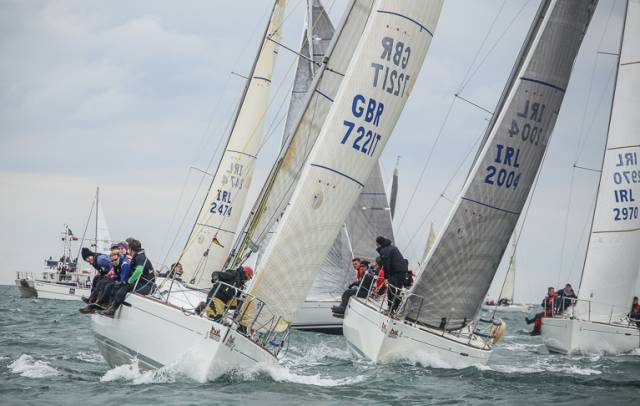Class captains from twenty Dublin Bay Sailing classes were briefed on the new Dublin Bay Sailing Club (DBSC) season this week. DBSC Commodore Chris Moore's briefing notes are below.
The first DBSC race will be on Tuesday 25th April, then the first Thursday race on 27th April and the first Saturday race on the 29th. The midweek race will be as usual finishing in the last week of August Tuesday 29th and Thursday 31st.
Highlights:
- Coastal Races
- Saturday dinghy racing
- End of season races
- ECHO handicaps
Coastal races: Since 2012, the three coastal races have been a regular feature of the DBSC programme. This, in a way, was imposed on us by the large international dinghy events which the clubs organise on a regular basis. As it happened, people actually liked the coastal races, as a welcome alternative to the short-leg courses we’ve been providing since about 2001.
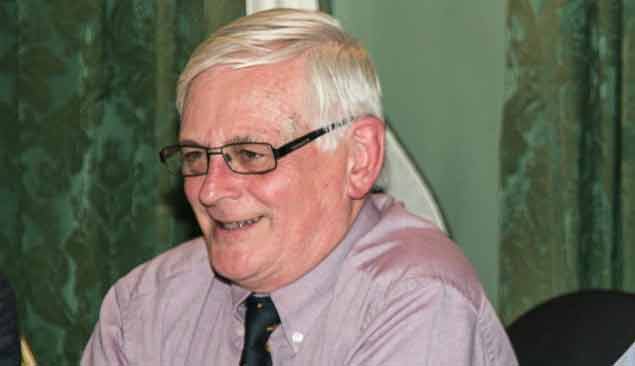 Chris Moore, Commodore of Dublin Bay Sailing Club
Chris Moore, Commodore of Dublin Bay Sailing Club
Also there’s been a trend that’s useful to take note of: members seem to be moving into bigger boats. Two Ruffian sailors have recently up scaled to 31.7s and the thriving Cruiser 1 fleet has an influx of people (like myself, indeed) who formerly raced in the lighter end of the keelboat fleet. Inevitably, this give rise to a feeling that some boats on the short, inshore legs, are not being sufficiently challenged – certainly on Saturdays, when we have more time to extend ourselves. It’s also a fact that up to about 2000 we always had some long legs on our courses. DBSC veterans – that is, people who raced before the turn of the century ! – will recall that the Burford buoys always formed part of DBSC courses.
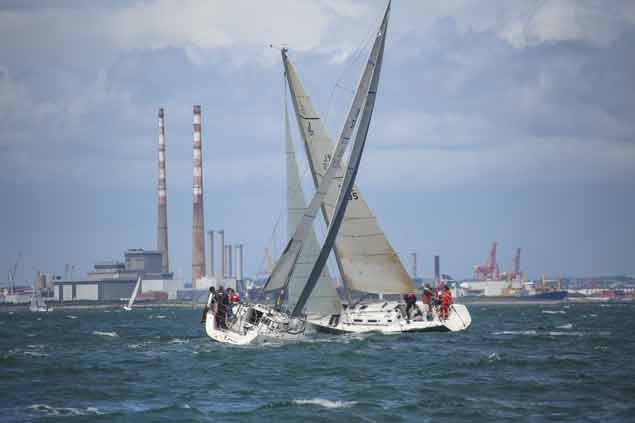 J109s race in a thriving DBSC Cruisers One class Photo: Afloat.ie
J109s race in a thriving DBSC Cruisers One class Photo: Afloat.ie
This year we’re building on the previous coastal programme, extending the legs out to the Kish lights and where weather conditions allow and even to race around the Moulditch buoy off Greystones. There will be, of course, provision to shorten course where the wind dies, and, indeed, if there are forecasts are for light winds, then we may fall back on the regular inshore programme and run the coastal races on another day. These longer courses will require earlier starts – probably about an hour. We’ll cover that later in a special notice.
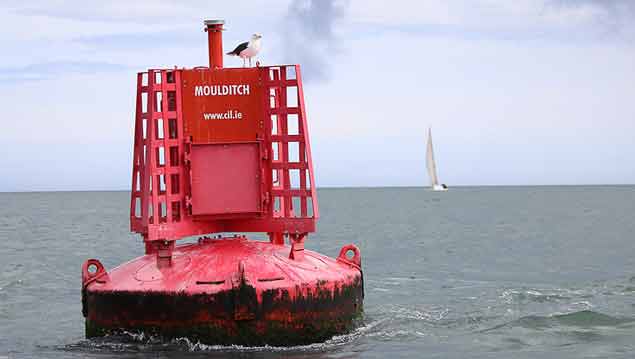 DBSC costal races may go as far south as the Moulditch buoy off Greystones in County Wicklow Photo: Afloat.ie
DBSC costal races may go as far south as the Moulditch buoy off Greystones in County Wicklow Photo: Afloat.ie
With no international dinghy events in the Bay this year, Tim Goodbody, has designed for us a set of courses with windward starts in the Bay –the first leg, for example, being Bligh mark with a reach out to the north Kish light. They will be shown on a new course card which is not part of the usual membership pack. Instead, it can be downloaded from the DBSC website. I should signal at this stage that downloaded course cards from the web site are likely to replace the present printed version. It’s the way things are going: the printed version is horrendously expensive. The web seems to be the way to go. The yearbook will continue to issue as before. We might even enlarge it.
I should add also that if weather conditions don’t suit the smaller keelboats, we can always have recourse to the platonic courses. With the right wind, these can be used give us Olympic courses, either windward-leeward or triangular which please an increasing number of people. I should add, too, that the green fleet will race, as usual, on their green fleet courses. They’re not included in the coastal race programme.
On Greystones, last year a number of fleets indicated that they would like DBSC feeder race to the Greystones regatta. We’ll provide this facility again this year but we insist that it must be an official class decision, communicated to us in the regular way by the class captain. The date is the 26th August.
The dates for the three coastal races are the 27th may, the 17th June and the 5th August. We’re putting the Royal Alfred label on them and Alfred cups or trophies will be awarded to the overall winners. Points for the series will also count for the main series as well .In the jargon, the coastal series is “ a series within a series”.
Dinghy racing: As last year’s midweek (Tuesday) series seems to have pleased nearly everyone, we don’t plan this year to change it in any way. Where there were difficulties was the week-end Saturday series.
For some time there had been a notable disinclination on the part of part of centre-board sailors to come out on Saturdays. Following the lead of the DMYC with its successful winter Sunday series, we thought we might give Sundays a try. The response was no better. In fact, there was the odd day when we had our expensive committee boat on hand, a race management team, a rib but no competitors.
Our first inclination, after this disheartening experience, was to forget about week-end dinghy sailing entirely, recognising that there were perhaps social or family trends in play. However, we don’t wish to have it said that DBSC does not support dinghy racing and following meetings with dinghy representatives we agreed to give Saturdays another try. This year dinghy racing will take place on 12 agreed days inside the Harbour when there are no clashes with other events. As the two committee boats are committee elsewhere, racing will be from a rib. Just as happens with the Wags on Wednesday evenings. We’re grateful to Declan Traynor, who will be in attendance with his rib, precisely for that purpose. DBSC will provide a patrol rib, and pay for the drivers and also marks and the other equipment needed. The dinghies will provide their own race officers and record keepers etc
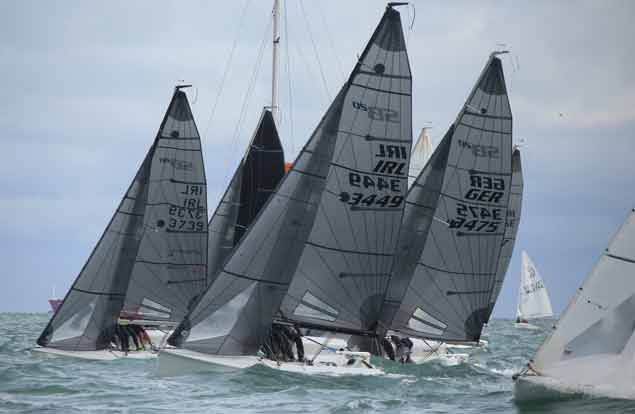 The DBSC SB20 start a race Photo: Aflaot.ie
The DBSC SB20 start a race Photo: Aflaot.ie
End of Season Races: We’re not going to hold the cruisers challenge this year. It’s been clear from some time that it had outlived its original purpose, which was to provide championship racing for cruisers which, unlike one-designs, had no such outlet. Nowadays they have, ICRA (the Irish Cruiser Racing Association,) and Kinsale, which is within easy reach of the larger Dublin Bay boats, and beyond that, if they are so minded, they can race in Cork Week every two years. Many boats were having a crew problems For our part, we in DBSC were having more than enough trouble in meeting our own needs in finding race officer personnel for our own regular racing personnel at that time of year., with so many people still away on holidays.
There is, of course, an argument that the Cruiser Challenge provided, in way, a wrap up, an air of finality, or closure, to the sailing season. It’s an interesting idea and we’ve decided to take it up and build on it - but applying it at the real end of the season, the day of the last Saturday races, the 30th September. All DBSC boats will be catered for – not only cruisers but one-designs and dinghies as well. It’ll be a sort of Grand Finale to the Dublin Bay season. It will also give some fillip, a bit of stimulation, to Saturday September racing which most years, with Thursday racing finished, trails away in a tired, lack lustre kind of way. Our plans are fluid at the moment but we hope to have regatta –style courses, say two races for every class, and start a bit earlier than usual. There will be special prizes and, like the coastal series, these races will count for regular Dublin Bay points.
ECHO Handicaps: The ECHO handicapping system has been with us since around 1984 and generally fulfils its purpose - providing a performance –based handicap system as an alternative to handicaps based on the IRC measurement system. Many DBSC cruisers boats, in fact, tend to rely on ECHO, leaving IRC to the (presumed !) hotshots. In the classical or original model, handicaps are adjusted on a monthly basis, which cuts out the see-saw effect deriving from unusual or out of character performances - coming, say, from winds that die away in one quarter of the Bay and leaving other quarters with perfect sailing conditions. Classical ECHO, in fact gives a balanced picture of a boat’s average performance, indicating how it can be expected to perform over a series of races.
Against that, advocates of the Progressive ECHO system - which adjust handicaps after every race - argue that classical ECHO is bit remote from the experiences of crews who like to be able to see how their handicap responds to their own experience of their boat’s performance. It certainly has the merit of being more transparent. Colin McMullen, who was around when Echo came on the scene so many years ago, points out that if computers were as prevalent then as they are now, we might have had progressive ECHO from the outset. His own sampling, by the way, shows that there is very little to choose from in the overall results from either system. Tim Costello, who is software engineer and former DBSC Commodore, has come to the same conclusion.
Anyway, we’re going to give progressive ECHO a try this season. If you want to see how a boats amended ECHO is displayed take a look at the DBSC web site. Most of last year’s results have been taken down but there are some results remaining for a Cruisers One race under ECHO. The ECHO TCCs for the next race ae displayed in the column on the extreme right.
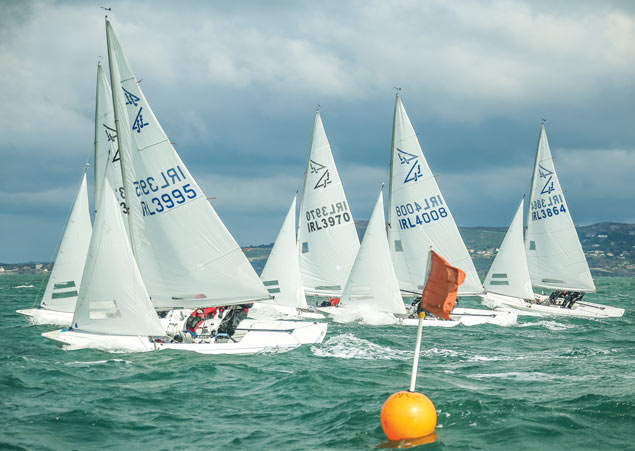 The buoyant DBSC Flying Fifteen fleet
The buoyant DBSC Flying Fifteen fleet
Late Entries: Talking about handicaps, may I suggest at this point that boats in cruiser classes be reminded to get their IRC cert to the secretariat in good time. There is always a big influx of certs at the last moment, much of it unnecessary and inexcusable. The same is true of boat entries. We’ve never been keen on late entry penalties but the in recent times these last minute late surges have been going beyond endurance for the secretariat and results function. Would you pas the word along?
Other Changes: What else in 2017? Cruisers 2 and Sigma 33s have finally re-amalgamated and they are now one class, with one class captain. However, the Sigmas will continue to get one – design results as well – another case of “a series within a series”. This is true also of the J109s within Cruisers 1.
BB21: And we have a new class – the B21s – emigrants, if you like, from Cruisers 3 - who are now numerous enough along the waterfront to have their own start. They will race on Thursdays and Saturdays with the red fleet, under both ECHO and one-design. The expectation is that with their own start this class should grow beyond its current numbers.
Mermaids: We come now to Mermaids, Dublin Bay’s oldest one-design class, designed for DBSC by J.B.Kearney in 1932. The club still holds the design rights, and Jonathan O’Rourke looks after the plans on behalf of DBSC. Locally, the Mermaids have fallen on bad times and, though three boats enter officially enter, sometimes only one boat turns up. From the scoring point of view, this is a problem because under the Racing rules of Sailing you can’t have a race with just only one boat.
To deal with this situation, and maintain some semblance of continuity, we’ve decided to have Mermaids race and scored under PY on Saturdays when they normally start in the Green Fleet with the Squibs. The Squibs will continue to get their one-design results and their DBSC regular points and their prizes are not affected in any way. It’s just that they get an extra set of results, showing them racing with the Mermaids. The Mermaid prizes will be based on PY and will be awarded to Mermaids only. There’s no problem with the PY handicaps. The RYA publishes a set of for all known dinghy designs but its rules are flexible and local fleets can change them to suit their own circumstances. Flexible, yes, but once fixed, we don’t plan to change them. Unless experience shows they’re definitely wrong, in which event we will bring them into line with what they shou;ld be.
I should assure members that administering PY is no big deal with DBSC. We do it all the time. Valerie Kinnear is our great expert on PY handicaps and in setting the initial PYs we can rely on he knowledge and experience.
Tuesday Racing: Finally, Tuesday keelboat racing. If people race on Tuesdays, and still have course cards on board their boats , they should get rid of them. Richella Carroll, who is race officer on most Tuesday nights, has made about a dozen changes to the courses. At this stage I should pay tribute to Richella and say how much we appreciate her knowledge and expertise at the Hut. She’s terrific race officer. The Hon. Secretary reminds me that she became a member of DBSC on the 2nd February 1955. No one has ever detected or noticed any lessening in her capabilities in course setting or managing a race. We wish her many more successful years at the West Pier at the West Pier.
One final matter: Boats in Cruisers 0, 1,2, 31.7 and Sigmas who race on Tuesday will have their results combined in one series. Turnouts on Tuesdays for these classes are very intermittent and it’s not worth the trouble giving them each separate series. If there are class or club prizes for Tuesdays, winners can can be taken from the combined results


























